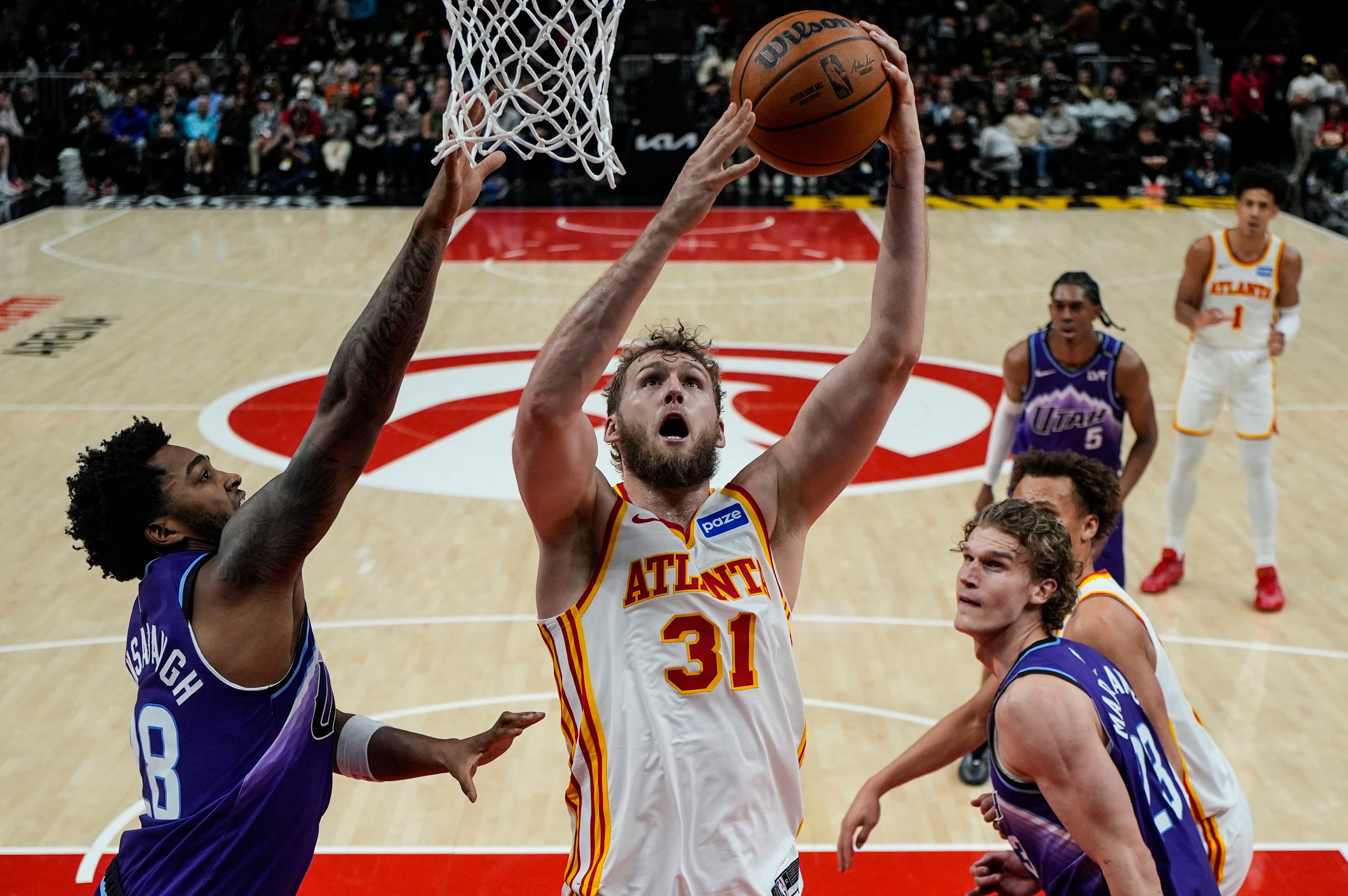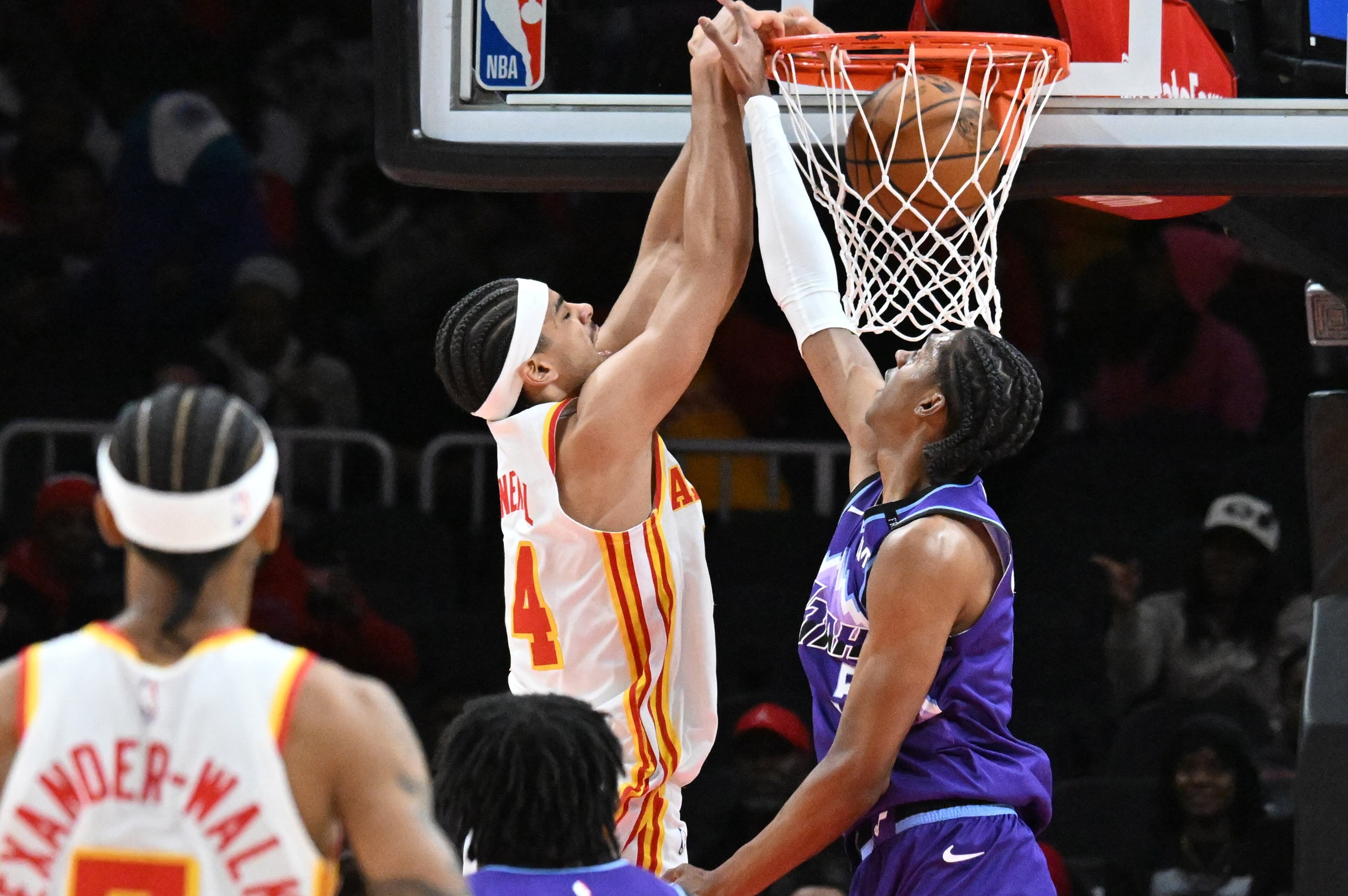Remembering when Hawks defined dysfunction with a rejected handshake

Editor's note: At a time when sports are shut down, including the canceled Final Four in Atlanta and many other postponed events, we take a look (in no particular order) at some of the bizarre moments from Georgia sports history.
Nearly 15 years before it was fashionable to reject the handshake, former Hawks General Manager Billy Knight already was regarding a proffered hand like it was a stranger’s dirty sock.
Call him the original social distancer, a pioneer, if you like. Or just call Knight one angry man with no interest in playing nice after watching his big deal undermined. Whatever, on that day in 2005, he turned a Boston courtroom as frosty as a meat locker.
It’s a photo that still today epitomizes professional sports dysfunction at the highest levels.
There is Steve Belkin, one of the nine-man ownership group that held the Hawks and the now-departed Thrashers, leaning in toward the team’s seated GM, right arm outstretched, hand open, the slightest hint of self-satisfaction on his face. He could have been a realtor at a closing or a fraternity president during rush week.
And there was Knight, sitting on a hard bench in a still mostly empty courtroom, regarding Belkin’s hand with a sidelong glance of passive-aggressive contempt.
“Nah, I don’t think so,” Knight’s body language said. “I’d rather reach into a bag of snakes.”
He left the millionaire hanging, and there Belkin would hang in perpetuity as the AP photographer snapped away.
They were supposed to be on the same team, the GM and one of his bosses, pulling in one direction, building a better tomorrow for a franchise that had spent the first five years of the 2000s winning only a third of its games and was then six years into an eight-year playoff drought.
Instead, so toxic was the ownership situation — oh, did we forget to mention that they were gathered in that courtroom only because the Hawks owners were engaged in a legal battle for control, rich guys fighting over their toys — that two key execs were unable to execute just one simple polite social gesture. And these men were supposed to build championships?
Arthur Triche, the once long-time Hawks head of communications, remembers well his reaction upon seeing that photo the next day.
“I’m driving down the East-West connector (in Cobb County) and open up the paper at a red light and go, ‘Oh, my God. No, Billy, no. No. No. No.’ ” Triche said.
“Whether it was right or wrong for (Knight) to do that, all I could think of was how much damage he had done to his career moving forward.
“The picture was going to go nationwide, which it did. And all I could think of was you didn’t shake your boss’s hand. It was disappointing in so many ways.”
To students of all that can go awry in Atlanta sport, the photo of the GM showing such public disdain for a team owner is worth far more than a thousand words. But space is limited, so, here briefly, was the story behind it:
Let’s begin with Atlanta Spirit, LLC. That was the quilt of part-owners that was stitched together in 2003 to purchase Atlanta’s NBA and NHL teams, and the building where they played, from AOL Time Warner. It was a far-flung group. Some from Atlanta – notably Michael Gearon Jr., son of the Hawks former GM and president, and Ted Turner’s son-in-law, Rutherford Seydel. Some from Boston — Belkin. Some from the Washington, D.C. area — business partners Bruce Levenson and Ed Peskowitz.
In August 2005, Knight made a move intended to give the rebuilding Hawks a player to build around, working a $70 million sign-and-trade deal that sent Boris Diaw and two future first-round draft picks to Phoenix for guard Joe Johnson. But Belkin, who demanded the position of team governor for his 30% ownership share, exercised his right unilaterally to veto the deal. Belkin believed the price too high for Johnson.
There would be other squabbles between the owners ranging between petty — All-Star game tickets and seating preference — to fundamental — disputes over the Hawks’ payroll (the Thrashers didn’t seem to figure in so much). The Johnson deal brought the ownership division to a boil.
“We were told to say the ownership friction was not a distraction, and the fact is it was a massive distraction,” Bernie Mullin, the former Atlanta Spirit CEO and too often the man caught in the crossfire, said last week.
Which led them all to that Boston courtroom, with Belkin on one side and all his partners and team execs on the other. Belkin was a seeking an injunction to stop the majority from removing him as the team’s NBA governor, which would remove the only obstacle to obtaining Johnson.
One of the first findings by Judge Obvious, not his real name, was that the Hawks were a team “in chaos.”
But more to the immediate matter, he granted Belkin his injunction, stating that he could not be removed without prior approval of then-NBA Commissioner David Stern.
Belkin’s victory was temporary and pyrrhic. For Stern wasted little time in issuing an affidavit supporting Belkin’s removal, and the Johnson deal was done. The outcast, Belkin would sell off his share of ownership, but not until 2010.
As Levenson said in ‘05, “It’s pretty obvious we’re going through a divorce right now. I would hope, sooner rather than later, (Belkin) comes to the realization that ... all that needs to be worked out now is the property settlement.”
But the divorce was years in the making. The owners couldn’t resist litigation, they’d take their battles to two other Maryland courtrooms before hostilities ceased. And in the process, the image of their basketball holding took a beating.
Wrote ESPN’s Scoop Jackson back then: “The pursuit of one Joe Johnson has made the Hawks the model franchise of ineptness in professional sports. We hope the 26 games they’ll win this season and the 30 they’ll win the next two seasons will end up being worth it.”
The Hawks would win 26 games in 2005-06 in Johnson’s first year. And win 30 the next. Then 37, making the playoffs as a sub-.500 team.
Big picture, the Atlanta Spirit legacy is a murky one.
Under their ownership, the Hawks did return consistently to the playoffs. Johnson turned out to be a fine player, a six-time All-Star in seven seasons with the Hawks, but an unwilling leader.
Knight — forever known as the man who drafted Marvin Williams instead of Chris Paul in 2005 — left the team three years later after he was unable to secure a satisfactory contract extension. He never assumed a similar position in the league again.
The Spirit sold off the hockey team to a group in Winnipeg in 2011.
In 2014, the reveal of a racially inflammatory email left Levenson little option but to bail on his ownership (other poorly chosen words would ensnare GM Danny Ferry). Soon thereafter, all old alliances gone, the remaining owners sold the team to current majority owner Tony Ressler.
Retracing his thoughts about when this hydra-headed Atlanta Spirit group first bought the team, Triche said, “You were like just let it work. You hoped they wouldn’t butt heads frequently and get to the point where they eventually eat themselves. But I guess that’s kind of what ended up happening.”
And there’s that photo, burned into the collective memory of Atlanta sports, forever casting this era of ownership as incapable of managing a mere handshake.
For what it’s worth, Mullen said, “I fully respect Billy Knight for doing what he did to this day. He is such a man of principal, and I think he saw Steve’s actions as a complete affront and lack of respect for his judgment. I understand that. (Belkin) put us in a terrible position as an organization.”
And it turns out what was a rebuke then ranks as sound medical advice today.



